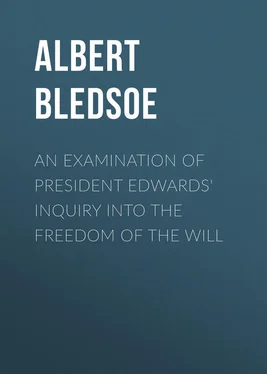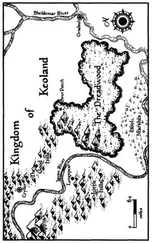Albert Bledsoe - An Examination of President Edwards' Inquiry into the Freedom of the Will
Здесь есть возможность читать онлайн «Albert Bledsoe - An Examination of President Edwards' Inquiry into the Freedom of the Will» — ознакомительный отрывок электронной книги совершенно бесплатно, а после прочтения отрывка купить полную версию. В некоторых случаях можно слушать аудио, скачать через торрент в формате fb2 и присутствует краткое содержание. ISBN: , Издательство: Иностранный паблик, Жанр: foreign_antique, foreign_prose, на английском языке. Описание произведения, (предисловие) а так же отзывы посетителей доступны на портале библиотеки ЛибКат.
- Название:An Examination of President Edwards' Inquiry into the Freedom of the Will
- Автор:
- Издательство:Иностранный паблик
- Жанр:
- Год:неизвестен
- ISBN:http://www.gutenberg.org/ebooks/35839
- Рейтинг книги:4 / 5. Голосов: 1
-
Избранное:Добавить в избранное
- Отзывы:
-
Ваша оценка:
- 80
- 1
- 2
- 3
- 4
- 5
An Examination of President Edwards' Inquiry into the Freedom of the Will: краткое содержание, описание и аннотация
Предлагаем к чтению аннотацию, описание, краткое содержание или предисловие (зависит от того, что написал сам автор книги «An Examination of President Edwards' Inquiry into the Freedom of the Will»). Если вы не нашли необходимую информацию о книге — напишите в комментариях, мы постараемся отыскать её.
An Examination of President Edwards' Inquiry into the Freedom of the Will — читать онлайн ознакомительный отрывок
Ниже представлен текст книги, разбитый по страницам. Система сохранения места последней прочитанной страницы, позволяет с удобством читать онлайн бесплатно книгу «An Examination of President Edwards' Inquiry into the Freedom of the Will», без необходимости каждый раз заново искать на чём Вы остановились. Поставьте закладку, и сможете в любой момент перейти на страницу, на которой закончили чтение.
Интервал:
Закладка:
Again. If we suppose there is a real strength in motives, that they exert a positive influence in the production of volitions, then we concede every thing to President Edwards. For, if motives are so many forces acting upon the will, to say that the strongest will prevail, is simply to say that it is the strongest. But if motives exert no positive influence, then when we say that one is stronger than another, we must be understood to use this expression in a metaphorical sense; we must refer to some property of motives which we figuratively call their strength, and of which we suppose one motive to possess a greater degree than another. If this be so, what is this common property of motives, which we call their strength? If they do not possess a real strength, if they do not exert an efficient influence; but are merely said, metaphorically speaking, to possess such power and to exert such influence; then what becomes of the self-evidence which President Edwards claims for his fundamental proposition motives exert a real force, of course the strongest must prevail; but if they only have something else about them, which we call their strength, it is not self-evident that the motive which possesses this something else in the highest degree must necessarily prevail. Hence, the great doctrine of President Edwards is either a proposition whose truth arises out of the very definition of the terms in which it is expressed, or it is utterly destitute of that axiomatical certainty which he claims for it. In other words, he has settled his great doctrine of the will by the mere force of a definition; or he has left its foundations quite unsettled.
Motives, as they are called, are different from each other in nature and in kind; and hence, it were absurd to compare them in degree. “The strongest motive,” therefore, is a mode of expression which can have no intelligible meaning, unless it be used with reference to the influence which motives are supposed to exert over the mind. This is the sense in which it clearly seems to be used by Edwards. The distinguishing property of a motive, according to his definition, is nothing in the nature of the motive itself; it consists in its adaptedness “to move or excite the mind to volition;” nor indeed could he find any other way of measuring or determining what he calls the strength of motives, since they are so diverse in their own nature from each other. He could not have given any plausible definition of the strength of motives, if he had looked at them as they are in themselves; and hence, he was under the necessity of defining it, by a reference to the “degree of tendency or advantage they have to move or excite the will.” Thus, according to the Inquiry, the will is determined by the strongest motive; and yet we can form no intelligible idea of what is meant by the strongest motive, unless we conceive it to be that which determines the will. The matter will not be mended, by alleging that the strongest motive is not defined to be that which actually determines the will, but that which has the greatest degree of previous tendency or advantage, to excite or move it; for we cannot know what motive has this greatest degree of previous tendency or advantage, except by observing what motive actually does determine the will.
This leads us to another view of the same subject. The strength of a motive, as President Edwards properly remarks, depends upon the state of the mind to which it is addressed. Hence, in a great majority of cases, we can know nothing about the relative strength of motives, except from the actual influence which they exert over the mind of the individual upon whom they are brought to bear. This shows that the universal proposition, that the will is always determined by the strongest motive, can be known to be true, only by assuming that the strongest motive is that by which the will is determined.
The same thing may be made to appear from another point of view. It has been well said by the philosopher of Malmsbury, “that experience concludeth nothing universally.” From experience we can pronounce, only in so far as we have observed, and no farther. But the proposition, that the will is always determined by the strongest motive, is a universal proposition; and hence, if true at all, its truth could not have been learnt from observation and experience. It must depend upon the very definition of the terms in which it is expressed. We cannot say that the will is in all cases determined by the strongest motive, unless we include in the very idea and definition of the strongest motive, that it is such that it determines the will. President Edwards not only does, but he must necessarily, go around in this circle, in order to give any degree of clearness and certainty to his doctrine.
That President Edwards goes around in this vicious circle, may be shown in another way. “It appears from these things,” says he, “that in some sense, the will always follows the last dictate of the understanding . But then the understanding must be taken in a large sense, as including the whole faculty of perception or apprehension, and not merely what is called reason or judgment. If by the last dictate of the understanding is meant what reason declares to be best, or most for the person’s happiness, taking in the whole of its duration, it is not true, that the will always follows the last dictate of the understanding,” p. 25. In this place, President Edwards gives no distinct idea of what he means by the last dictate of the understanding, which the will is said to follow in all cases. But in the eighth volume of his works, that dictate of the understanding which the will is said to follow, is called the “practical judgment;” and this is defined to be, “that judgment which men make of things that prevail, so as to determine their actions and govern their practice.” Here again are we informed, that the will always follows the practical judgment, and that the practical judgment is that which men make of things that prevail, so as to determine the will.
The Inquiry itself furnishes abundant evidence, that I have done its author no injustice. “I have chosen,” says he, “rather to express myself thus, that the will always is as the greatest apparent good, or as what appears most agreeable , than to say the will is determined by the greatest apparent good, or by what seems most agreeable; because an appearing most agreeable to the mind, and the mind’s preferring, seem scarcely distinct. If strict propriety of speech be insisted on, it may more properly be said, that the voluntary action , which is the immediate consequence of the mind’s choice, is determined by that which appears most agreeable, than the choice itself.” After all, then, it seems that choice itself, or volition, is not determined by that which appears the most agreeable; because, in reality, the sense of the most agreeable and volition are one and the same thing. But surely, if we cannot distinguish between choice and the sense of the most agreeable, then to say that the one always is as the other, is only to say that a thing is always as it is. Edwards saw the absurdity of saying that a thing is determined by itself; but he does not seem to have seen how insignificant is the proposition, that a thing is always as it is, and not otherwise; and hence this is the form in which he has chosen to present the great leading idea of his work on the will. And henceforth we are to understand, that the preference of the mind is always as that which appears most agreeable to the mind; or, in other words, that the preference or choice of the mind is always as the choice of the mind.
This is not all. President Edwards himself has frequently reduced the fundamental doctrine of the Inquiry to an identical proposition. It is well known, that “to be determined by the strongest motive,” “to follow the greatest apparent good,” “to do what is most agreeable,” or “what pleases most,” are all different modes of expression employed by him to set forth the same fundamental doctrine. In speaking of this doctrine, he says: “There is scarcely a plainer and more universal dictate of the sense and experience of mankind, than that, when men act voluntarily, and do what they please, then they do what suits them best, or what is most agreeable to them . To say, that they do what pleases them, but yet not what is agreeable to them, is the same thing as to say, they do what they please, but do not act their pleasure; and that is to say, that they do what they please, and yet do not what they please.” Most assuredly, if to deny the leading proposition of the Inquiry, is to deny that men do what they please when they do what they please; then to affirm it, is only to advance the insignificant truism, that men do what they please when they do what they please. It seems to me, that after President Edwards had reduced his fundamental proposition to such a truism, he might very well have spared himself the three hundred pages that follow.
Читать дальшеИнтервал:
Закладка:
Похожие книги на «An Examination of President Edwards' Inquiry into the Freedom of the Will»
Представляем Вашему вниманию похожие книги на «An Examination of President Edwards' Inquiry into the Freedom of the Will» списком для выбора. Мы отобрали схожую по названию и смыслу литературу в надежде предоставить читателям больше вариантов отыскать новые, интересные, ещё непрочитанные произведения.
Обсуждение, отзывы о книге «An Examination of President Edwards' Inquiry into the Freedom of the Will» и просто собственные мнения читателей. Оставьте ваши комментарии, напишите, что Вы думаете о произведении, его смысле или главных героях. Укажите что конкретно понравилось, а что нет, и почему Вы так считаете.












